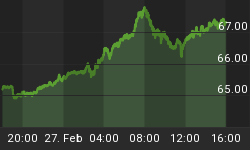In normal times, today's combination of record low interest rates and massive infusions of capital into the banking system would ignite the mother of all expansions. That it hasn't has confused the economists whose textbooks clearly state that it should. And it has convinced the Fed to just keep upping the ante with QE after QE, so that bank excess reserves, which are historically around zero (because lending out as much as possible is how banks make money) have risen to completely unprecedented levels.

The reason these reserves haven't found their way into loans and then into consumer spending is that five years ago most banks nearly died and many consumers nearly went broke, and neither group was going to forget the experience soon. So the velocity of money - the rate at which each existing dollar changes hands via loans and spending -- sank to historic lows that are a mirror image of money creation and bank reserves.

But that may be about to change. Home prices and stock indexes are soaring, which makes consumers and small businesses both a lot more creditworthy and a lot more interested in leverage. Banks, meanwhile, are finally realizing that they've left a ton of money on the table by not writing mortgages and business/personal loans into the strength of these nascent asset bubbles. And the only thing that scares a banker more than future massive defaults is being left behind by a boom in the current quarter. They're reacting, as they always eventually do, by looking to lend:
Fed Survey: Banks eased lending standards, "experienced stronger demand in most loan categories"
From the Federal Reserve: The July 2013 Senior Loan Officer Opinion Survey on Bank Lending Practices
The July 2013 Senior Loan Officer Opinion Survey on Bank Lending Practices addressed changes in the standards and terms on, and demand for, bank loans to businesses and households over the past three months. The survey also contained special questions about changes in banks' lending standards on, and demand for, the three main types of commercial real estate (CRE) loans over the past year, and on the current levels of banks' lending standards for many types of business and household loansrelative to longer-term norms. In the July survey, domestic banks, on balance, reported having eased their lending standards and having experienced stronger demand in most loan categories over the past three months. This summary is based on the responses from 73 domestic banks and 22 U.S. branches and agencies of foreign banks. Regarding loans to businesses, the July survey generally indicated that banks eased their lending policies for commercial and industrial (C&I) and CRE loans and experienced stronger demand for such loans over the past three months ... The survey results also indicated that banks eased standards and terms on, and saw increases in demand for, some categories of lending to households. Modest net fractions of respondents reported having eased standards on prime residential or nontraditional mortgage loans, and a large net fraction indicated that they had seen increased demand for prime mortgage loans. A moderate net fraction of respondents reported that they had eased standards on auto loans over the past three months, and small net fractions indicated that they had eased standards on credit card loans and other consumer loans. Demand for all three types of consumer loans asked about in the survey had reportedly strengthened, on balance, over the second quarter.
What does this mean? Just that human nature is unchanging. We relive our most recent intense experience until a new intense experience pulls us in. That's where booms and busts come from, and that's why they're getting bigger. Each bust is more severe and takes longer to get over, which forces panicked governments to try even harder via deficits, money creation and interest rate manipulation, to make us forget.
Eventually the boom/bust amplitude will become overwhelming. An asset bubble will broaden into an Austrian crack-up boom. Or a bust will be so deep and pervasive that it becomes a decade-long Kondratieff winter.
There's no guarantee that this incipient pick-up in lending will turbocharge the current asset bubble. It could be a false alarm, to be followed by another downturn (there are plenty of data points suggesting that this is the case). But if so, the world's governments and central banks will just up the ante again. Because fiat currency is essentially play-money, the numbers can be as large as the owners of the printing press care to make them.
So while the fiat currency bubble is clearly entering a new chapter, it's not yet clear what the chapter is.
















